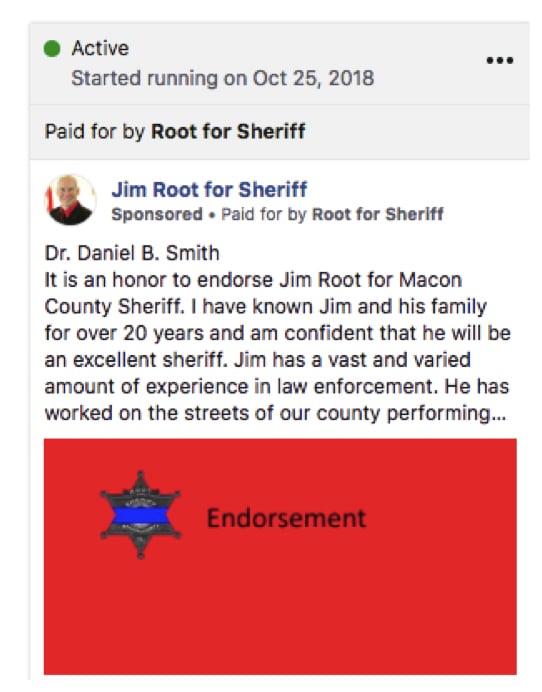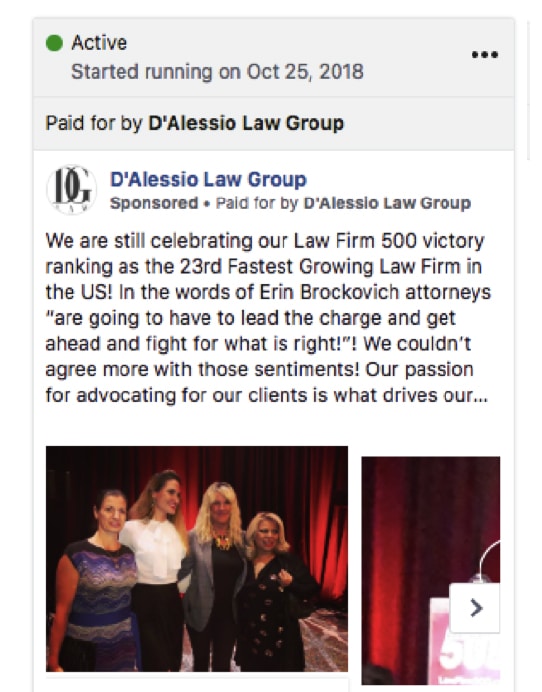Many lawyers use online advertising to generate traffic for their website with the goal of gaining new business for their firm. While there are opportunities to advertise on legal-specific directories such as Lawyers.com, FindLaw or Avvo, many firms like to use the biggest online advertising players available: Google and Facebook.
Complexities of Google Ads
If you are using Google Ads (often called Google pay-per-click or PPC), you know the legal industry has some of the most expensive keywords on Google. It’s not uncommon for new campaigns to cost over $50 per click. When I compare notes with agency colleagues who run Google Ads campaigns for e-commerce companies, they are shocked at the cost-per-click for legal keywords. In their industries, they are still in the few-dollar range for clicks.
With paid online advertising, you are paying for traffic to your website. Because you are likely spending a significant amount to do so, you should do everything to maximize the yield of that initial investment. There are many ways to do so, such as working on optimizing your website and landing pages for conversion, incorporating live chat, and optimizing for mobile experience with click-to-call and texting options. These are important, but once you pay for someone to visit your website and they leave, they are lost.
To help recapture visitors, a few years ago online advertisers developed a concept called “remarketing” or “retargeting.” By tagging the visitors to your website, you can pay to put advertising in front of them as they travel around the web. It is the online equivalent of putting a billboard in just the right place for the commute of someone who was recently referred to you.
Remarketing is a great way to maximize the yield of your initial high cost for that visitor, especially because remarketing tends to be significantly less expensive than the initial ads that first generated the visitor.
Denied! Remarketing Woes for Law Firms
Unfortunately, this advertising option is coming to an end for many law firms.
Over the past year, we noticed that more and more remarketing ads were being denied by Google. Google has always had policy guidelines for remarketing ads, which they categorize as “personalized advertising.” You can read about them at Google Advertising Policies Help: Personalized Advertising.
Here is the specific part of the policy that is getting all of these ads denied:
Personal Hardships
We understand that users don’t want to see ads that exploit their personal struggles, difficulties, and hardships, so we don’t allow personalized advertising based on these hardships. Such personal hardships include health conditions, treatments, procedures, personal failings, struggles, or traumatic personal experiences. You also can’t impose negativity on the user.
Advertisers can’t use personal hardship categories to target ads to users or to promote advertisers’ products or services. See below for specific examples of what we don’t allow.
In the past, examples of personal hardships mainly related to alcohol, health issues and drugs. Over the past year, however, we have seen Google add examples to this list specific to divorce, injury and criminal ads.
While not ideal for many law firms, if you think about it from the end-user perspective, there is much logic to the policy. One of our contacts at Google told me this:
“An example I often use is that of a divorce lawyer. A married couple is going through a rough patch and one of the parties involved confidentially looks at a divorce lawyer’s page but later disregards that as an option. Their spouse may use the same computer weeks later and be served remarketing advertisements for that divorce lawyer. This would reveal private information and could lead to the escalation of undesirable circumstances for the couple.”
Also, consider the circumstance where someone who is dealing with a criminal issue does some research on their laptop by reading informational content on a few law firm websites. Then, during a presentation or discussion at work, they visit a webpage that is surrounded by remarketing ads from a law firm saying they can help with that particular criminal issue. This would be extremely embarrassing.
You can continue to use remarketing ads if you are an estate planning or business lawyer. If you are a general practice firm, you can use ads as long as they don’t mention specific practice areas. Keep the ad focused only on the law firm’s brand.
Note that if you are currently running remarketing ads in one of the personal hardship areas mentioned in the guidelines, they are probably fine. Google does not seem to be taking the time to go back and retroactively deny ads that are already running. It is up to you to think about the reason for the guideline and decide if you want to keep running your ad or take it down.
A Strange Facebook Rule
Facebook has always been fickle when it comes to their advertising policies and which ads get approved. Usually, it is a process of trying something, waiting for the ad to get denied, and then adjusting the text or image and trying again and again until Facebook approves it. While a bit of a pain, it was something we all got used to.
Facebook also allowed remarketing. And, while it has not been as strict as Google, it is not uncommon for retargeting ads around criminal practice areas to be denied.
Their prohibited ad policy does not yet call out divorce and criminal ads like Google does. It does contain the following policy, though, which I have been referred to when a client’s advertisement gets denied:
12. Personal Attributes
Ads must not contain content that asserts or implies personal attributes. This includes direct or indirect assertions or implications about a person’s race, ethnic origin, religion, beliefs, age, sexual orientation or practices, gender identity, disability, medical condition (including physical or mental health), financial status, membership in a trade union, criminal record, or name.
Similar to Google, we worked it out. Recently, however, something else began happening in Facebook that made us scratch our heads.
Following the big scandal Facebook faced after the 2016 presidential election, it created a new policy requiring anything that could be construed as an “Ad related to politics or issues of national importance” to be certified and carry the term “paid for by” the entity or person responsible for the ad.
Here is an ad you would expect to have a “paid for by” notice:
This sounds fair and seems like a good move by Facebook. But then we noticed that law firm ads were being denied by Facebook under this policy. Essentially, we had to get certified as an agency to be able to run these law firm ads or have our clients get certified.
Here is an example of a law firm that had to get certified by Facebook to run an ad celebrating their Law Firm 500 ranking:
I don’t know why Facebook is including law firms under this policy and I have not been able to get a straight answer from my Facebook contacts.
Getting certified and getting the ad approved is not an insurmountable issue. Many law firms, like the one above, have done this. But some lawyers don’t want to get certified because it makes it seem as if their ad is political advertising.
Online Advertising: Difficult But Not Impossible
Despite these new challenges with Facebook and Google, many law firms are still able to get a positive return on their advertising investment. Still, it does get more and more difficult each year. In addition to more law firms jumping into paid advertising, which increases the cost-per-click, we now have Google and Facebook policies impacting your advertising.
If you are buying advertising from Google or on social media sites like Facebook, make sure to take a lot of time to study their advertising policies. Also, make sure your website is set up to capture leads and maximize the yield of your paid advertising investment. And if you are using an agency to handle your ads, make sure it is certified with each platform and has a good track record.



















